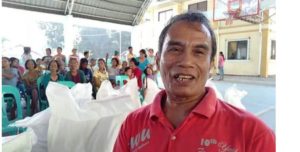
Tatay Romelito Medel, 63 yo, Barangay Guisguis in Sta. Cruz, Zambales; Jan. 18, 2020
When super typhoon Ompong (international name Mangkhut) tore through Regions I, II, III, and the
Cordillera Autonomous Region (CAR) in September 2018, barangay Guisguis in coastal town Sta. Cruz,
Zambales was not spared from its wrath.
Romelito Medel, 63 years old, was with his 73-year old wife, when strong winds and rains were felt at
6:00pm on Sept. 14, 2018. They were still inside their house when it collapsed. Floodwaters from the
river reached waist-high. At 8:00pm, they fled and sought shelter from a neighbour whose house is
made of concrete. They spent the night there until 5:00pm the day after. Forgetting that they hadn’t had
any dinner, what was foremost on their minds was to survive the night.
The couple was caught off guard and was not able to prepare before the typhoon made its landfall. They
did not have a television nor a radio so they did not know that a catastrophic storm was about to hit
their community. The barangay officials also failed to warn the residents. Because of this, they were not
able to prepare ready-to-eat or easy-to-cook food in case they needed to evacuate.
They were at a loss when they returned to their house. Everything was in chaos. Tatay Romelito recalled
feeling helpless and not knowing where to start. For several nights, the old couple slept on old
cardboards and worn-out mat.
They received a relief pack from the barangay but this was one time only. Getting back on their feet was
twice as difficult because they are already old and Tatay Romelito has a disability. He has a benign tumor
on his lower back (lumbar area) which forced him to stop working 10 years ago. He and his wife had
been relying on their five children, already with families of their own, for support.
Tatay Romelito and his wife, were among the priority beneficiaries of the series of assistance from
Diakonie Katastrophenhilfe (DKH) and GFFO extended in barangay Guisguis. Both senior citizens, they
belong to families in their community who had the least-coping capacity to recover. Their house was
destroyed by the typhoon. Tatay Romelito is also an elderly with a disability, unable to work anymore.
During the emergency phase, he initially received a food and non-food relief pack from Diakonie
Katastrophenhilfe thru CDRC and Alay Bayan-Luson, Inc. (ABI). After that, he was also one of the
beneficiaries who received an PhP8,700.00 cash assistance from GFFO. A year and four months after, he
received agricultural and livelihood support (palay, corn and vegetable seeds and organic fertilizer) from
DKH.
Tatay Romelito shared that because of all the blessings that he received, he felt that it’s as if “a thorn in
his side was taken out.” Because of the material and cash assistance, they had food to sustain them and
his son was able to repair their house little by little. Now that he received livelihood assistance, he is
hopeful that his family will finally be able to recover. He gave the palay and corn seeds to his son who is
a tenant in a two-hectare land. This comes with a clear agreement that they get a share every harvest,
for their consumption and other needs. As for the vegetable seeds, he and his wife will do the planting
since vegetable gardening is the only thing they can do given their situation.
Aside from the assistance mentioned above, Tatay Romelito also benefitted from the trainings
conducted by the project staff. Because of their nightmarish experience during the super typhoon
Ompong and the trainings he attended, he has a deeper appreciation of disaster preparedness.
According to him, trainings on disaster preparedness have a key role in ensuring that community
members know where to go and know how to keep themselves safe when an emergency occurs. Early
warning system should also be installed in the barangay so the residents receive relevant and timely
information prior to a disaster in order to take immediate action based on these information. He
recalled how frightening it was being caught unaware at night and not being able to do much because
Ompong was already upon their community.
Aside from being equipped with the right information and skills in disaster preparedness, and with the
local officials doing their part in protecting their constituents, Tatay Romelito hopes that the seeds
prosper so they can have a good harvest. He vows to persevere in vegetable gardening, even with what
little energy he has.
Teary-eyed, he thanked DKH, CDRC and ABI.
“With these livelihood inputs which we can use to start over, we will continue to work as hard as we
can,” he ended.
